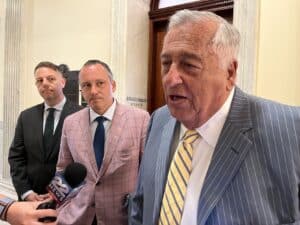
House Speaker Ron Mariano (right), flanked by House Ways and Means Committee Chair Aaron Michlewitz (center) and Housing Committee Co-chair Rep. James Arciero (left), speak to reporters about their $6.2 billion housing bond bill redraft on June 3, 2024. Photo by Sam Drysdale | State House News Service
After one of his first public appearances at the State House since formal sessions ended on July 31, House Speaker Ron Mariano defended the Legislature’s right to make laws throughout the two-year session, telling reporters that it doesn’t matter to him whether major bills get done before or after November’s election.
“These things take time. It’s like making a stew. It’s not done until it’s done,” he said.
The Legislature since 1995 has operated under a rule that discourages major legislating in the weeks leading up to and following biennial elections. That joint rule has resulted in the bulk of legislating occurring before July 31 in election years, but as House and Senate Democrats in recent years have been unable to reach timely agreements on bills, they’ve pushed more of their action later into the year.
Informal sessions are scheduled to run until as late as New Year’s Eve this year, with the new Legislature to be sworn in on Jan. 1, 2025.
If the Legislature waits until after the election to pass a number of important bills still before them this session – including those on hospital oversight reform, substance abuse and safe injection sites, economic development, and clean energy – that means that lawmakers who aren’t returning in 2025 could have a say in controversial matters in the weeks just before a new Legislature is seated.
This year, three senators and 15 representatives are either seeking a different office or not seeking reelection.
When a reporter asked if members who aren’t returning in 2025 should have a say, Mariano bristled.
“Why are they lame duck?” he said. The reporter answered that it would be after election day.
“So what? They were elected to fill the whole term to January of next year. They are elected to serve the whole term,” he said.
Most legislators don’t attend the twice-weekly legislative sessions that occur in the House and Senate between August and December, but any one lawmaker who is present can block any bill from advancing as long as there isn’t a quorum present.
There has also traditionally been no debate during informal sessions, although senators have in recent years begun delivering statements during informals. Last year, the House and Senate got a quorum together during informal sessions to pass a controversial spending bill.
The Legislature concluded formal business for the two-year session this summer by meeting all night and gaveling out with nine conference committees undecided on major policy bills that had cleared the branches in differing forms.
Over the past two months, they’ve come to agreements on four of those bills: maternal health, long-term care, an expansion of Boston liquor licenses, and legislation to use rainy day fund interest to lure federal matching funds and pay down state debt.
Mariano on Thursday pushed back on the narrative in the media this summer that the Legislature was done passing most major bills until next January, when they return to formal sessions.
“You all said we were going to be dead on the 31st, the world was going to stop. And we kept telling you. That’s not the case,” he said.
Over the past few legislative sessions, the Legislature has deviated from historical norms by passing more and more unfinished major bills during the informal stretch of the fall.
Lawmakers originally reformed the rules to effectively eliminate lame-duck sessions in 1995 after a situation the year before when lawmakers approved a 55 percent pay raise for themselves post-election, which was immediately followed by the quiet passage of a capital gains tax cut, giving the impression of a quid pro quo for former Gov. William Weld, who proposed the pay hike.
Though lawmakers this year have come to a compromise on four conference committees during informal sessions, the remaining five have major obstacles, and Mariano gave no indication Thursday that there has been much progress made on them.
In fact, he said that Thursday’s event – a bill signing of a long-term care bill, nearly two months after the conclusion of formal sessions – was the first time he had spoken to the Senate president in-person since the night of July 31.
“We just had a nice conversation this morning. We’ll talk next week,” he said.
Mariano said they’ve talked on the phone, and while they had policy disagreements at the end of session, “nothing’s personal.”
One of the bills held up in conference committee is a hospital oversight bill crafted to thwart another health care crisis like the one currently playing out with Steward Health Care.
Asked if the negotiations were progressing, Mariano said, “There are talks.”
“I don’t know if – I’m not going to say it’s progressing, because I don’t monitor them daily. But they are talking,” he said.
Mariano also told reporters on Thursday that he plans to run for speaker again if he gets reelected to the House, which is likely as he is running unopposed. He didn’t respond to a question on whether he would serve the full two-year term.
“Gotta get elected first in November. And I’m gonna run for speaker again in January. And I wanna get elected to that. I have a few hurdles in front of me before any decisions are made,” he said.
Mariano had bruising and a scab on the tip and bridge of his nose, and he said he fell up granite stairs in his hometown of Quincy, “running late, as usual.” During the bill signing, he made several jokes about the injury, saying he had gotten into fights with Rep. Thomas Stanley, who led the conference committee on the long-term care bill Gov. Maura Healey signed on Thursday.






